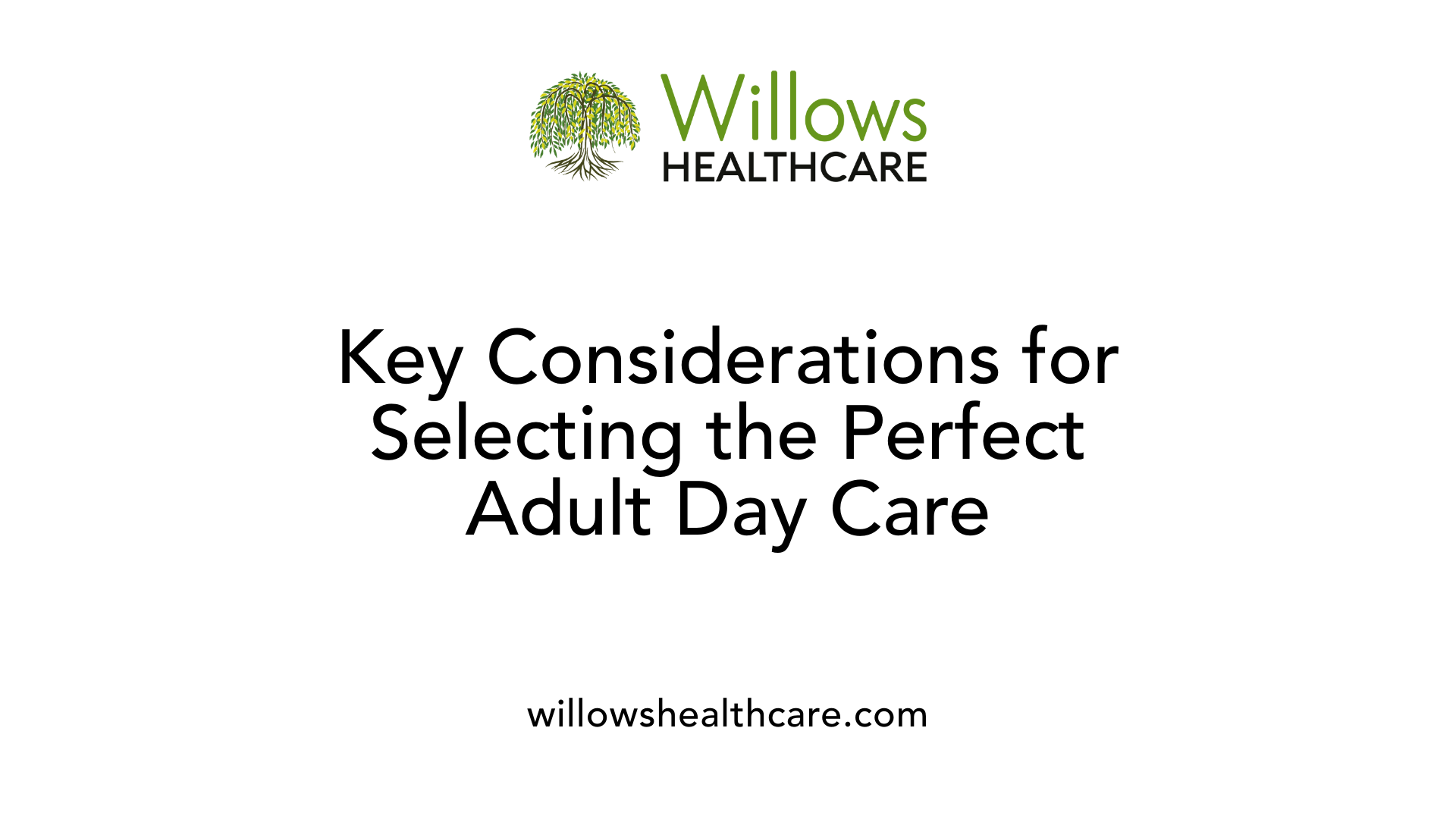How to Find the Right Adult Day Care Program for Your Loved One
April 24, 2025
Guiding Families to the Best Fit in Adult Day Care


Understanding the Essentials of Adult Day Care Programs
Choosing the right adult day care for a loved one is a critical decision that impacts their well-being, safety, and happiness. These community-based programs are designed to provide structured care, socialization, and health services during the day, supporting both seniors and their families. This article explores everything you need to know to make an informed choice, including services offered, key considerations, assessment processes, evaluation tips, and how to navigate enrollment.
What Are Adult Day Care Programs and What Do They Offer?

Overview of adult day care
Adult day care programs are community-based services designed to support older adults and individuals with disabilities during daytime hours. These programs provide a safe, engaging environment where participants can partake in social, recreational, and health-related activities. The main purpose is to foster independence, maintain social connections, and improve overall well-being while giving caregivers a necessary break.
Types of adult day care services
There are generally two types of adult day care: social day care centers, which focus on socialization, wellness, and recreational activities; and adult day health care centers, which provide more intensive medical, therapeutic, and supervision services. The social model emphasizes engaging activities such as arts and crafts, music, and group outings, while the health model includes health screenings, medication management, and physical or occupational therapy.
Activities and health services included
Activities in adult day care programs are designed to promote mental and physical health. They often include nutritious meals and snacks, physical exercises, brain-stimulating games, and creative outlets. Health services might involve health monitoring, medication administration, and screenings for conditions like hypertension or diabetes. Personal care, such as assistance with grooming and toileting, can also be part of the offerings. These programs aim to create a stimulating, supportive environment that helps participants stay active, socially connected, and safe.
Key Factors in Choosing the Right Program

What are the key considerations and factors to keep in mind when choosing an adult day care program?
Selecting the appropriate adult day care involves careful assessment of several important aspects to ensure it meets your loved one's needs and provides peace of mind. Start by researching each facility’s licensing and accreditation, as these credentials indicate adherence to safety and care standards.
Visiting programs in person is highly recommended. During a visit, observe how staff interact with participants, the safety measures in place, cleanliness, and the overall atmosphere. A welcoming, well-maintained environment reassures families that seniors are in good hands.
It’s crucial to consider the specific health, mobility, and cognitive needs of your loved one. The chosen center should offer tailored services, such as medical support for chronic conditions or cognitive activities for memory care. Ensure the activities are engaging and suited to their interests.
Key logistical considerations include location and accessibility—closer centers can ease transportation worries. Understand the hours of operation and whether they offer flexible attendance options to accommodate your schedule.
Financial factors are also vital. Review costs carefully, including daily or hourly rates, and explore funding options like Medicaid, veterans’ benefits, or sliding scale fees. Clarifying what is covered and what additional expenses may arise helps avoid surprises.
Finally, involve your loved one in the decision. Encourage them to visit centers and voice their preferences to foster comfort and familiarity. Prepare a list of questions about staff qualification, emergency protocols, daily routines, and activity programs.
In sum, a well-chosen adult day care combines safety, engaging activities, tailored services, convenient location, financial viability, and positive staff interactions, creating an environment where seniors can thrive and families can gain peace of mind.
Assessing Your Loved One’s Needs
 When choosing an adult day care program for a loved one, the first step is to thoroughly assess their specific needs. Start by reviewing their medical history, cognitive status, and physical abilities. This helps determine whether they require supervision, medical support, or assistance with daily activities.
When choosing an adult day care program for a loved one, the first step is to thoroughly assess their specific needs. Start by reviewing their medical history, cognitive status, and physical abilities. This helps determine whether they require supervision, medical support, or assistance with daily activities.
It's also important to consider their social preferences and interests. Do they enjoy group activities, arts and crafts, music, or gentle exercise? Identifying activities that engage your loved one can help find a program that promotes mental and emotional well-being.
Safety and environment are crucial factors. Visit centers to observe their safety protocols, cleanliness, and overall atmosphere. Evaluate if the staff-to-participant ratio meets safety standards and ensures personalized attention. Check for emergency procedures, medication management, and accessibility features.
Additional practical considerations include location and transportation options to make attendance convenient. Ask about hours of operation and whether the center offers flexible scheduling that fits your needs.
Financial aspects are also important. Review costs per day or month, available payment plans, and insurance or government assistance options such as Medicaid or veteran benefits. Ensuring the financial feasibility will help sustain long-term participation.
Gather feedback from other families or online reviews about the center’s reputation and quality of care. Visiting several centers allows you to compare environments, staff interactions, and activities offered.
In summary, a comprehensive assessment of your loved one’s medical, social, safety, and logistical needs—coupled with visits and inquiries—will guide you in selecting an adult day care that provides a safe, supportive, and engaging environment tailored to their unique needs.
Questions to Ask When Visiting Centers

What questions should you ask when evaluating adult day care options?
When exploring adult day care programs for a loved one, it’s crucial to gather comprehensive information to ensure the facility meets the specific needs of the individual. Start by asking about licensing and accreditation, which verify that the center complies with health and safety standards. Inquire about its history of operation, staff credentials, and ongoing training to assess the quality of care.
Next, discuss the types of services available. Confirm if the center offers assistance with daily activities like bathing, grooming, and mobility, as well as health management, medication supervision, and therapeutic options such as physical or occupational therapy. If your loved one has special needs, ask about specialized programs for conditions like dementia.
Logistical questions are also important. Find out about the center’s hours of operation, transportation services, and policies for late pickups. Observe the staff-to-participant ratio to gauge the level of individual attention your loved one might receive.
Safety protocols should be a priority. Ask how emergencies are handled, whether staff is trained in first aid and CPR, and what safety measures are in place. Enquire about the environment’s cleanliness, accessibility features, and facilities for emergencies.
Cost is another key factor. Clarify the daily or monthly fee, payment plans, and accepted payment options. Also, explore potential financial support such as Medicaid, veterans’ benefits, or sliding scale fees.
Finally, try to assess the atmosphere during your visit. Is the environment warm, welcoming, and clean? Do staff interact positively with participants? Knowing how the center involves family members and the types of activities offered can provide a more complete picture.
Thoroughly asking these questions during your visits will help you select a safe, well-run adult day care program that provides a meaningful, supportive environment for your loved one.
Benefits of Adult Day Care for Seniors and Families

What are the benefits of adult day care for seniors and their families?
Adult day care provides older adults with a stimulating environment full of social, recreational, and health-oriented activities. These programs help reduce feelings of loneliness and promote mental and emotional health through engaging social events, mental stimulation exercises, and physical activities. Seniors gain access to health services such as medication management, vital sign monitoring, and therapies like physical and occupational therapy, which support their overall health and help delay cognitive decline.
For families, adult day care offers invaluable respite from daily caregiving duties. This break reduces emotional and physical stress, allowing caregivers to rest, work, or focus on other responsibilities without worry. It also provides peace of mind, knowing their loved ones are in a safe, supervised environment that caters to individual needs.
By maintaining social and health support, adult day care often delays the need for more restrictive or expensive long-term care options like nursing homes. Many centers tailor services to specific conditions, such as dementia care, and accommodate cultural or personal preferences, further enriching seniors’ lives. Overall, adult day care enhances quality of life for older adults while supporting their families—fostering independence, social connection, and health.
Operational Features and Types of Programs

How do adult day care programs operate and what features do they typically include?
Adult day care programs are designed to support older adults during daytime hours, typically from 9 a.m. to 5 p.m., Monday through Friday. These centers serve as a safe, engaging environment where seniors participate in a variety of social, recreational, and health-related activities. The programs aim to keep participants mentally and physically active while preventing social isolation.
Most adult day care centers are located in community-based settings such as senior centers, hospitals, faith-based organizations, or dedicated facilities. They are staffed by well-trained professionals, including nurses, therapists, social workers, and activity coordinators, ensuring participants receive appropriate care and attention.
Features of adult day care include nutritious meals and snacks, assistance with personal care tasks like grooming or toileting, and transportation services to and from the center. Health services such as medication management, health screenings, and physical, occupational, and speech therapy are often available, especially in adult day health care centers.
There are two primary models of adult day care:
| Model Type | Focus | Typical Services | Target Participants |
|---|---|---|---|
| Social Adult Day Care | Socialization and recreation | Arts and crafts, music, games, outings, exercise | Seniors wishing to stay active socially, generally healthy but needing companionship |
| Adult Day Health Care | Medical and therapeutic services | Medical monitoring, therapy, health assessments, medication oversight | Seniors with chronic conditions, cognitive impairments, or needing rehabilitation and health supervision |
Overall, these programs are designed to improve quality of life, support aging in place, delay institutionalization, and give caregivers relief. By providing a structured day filled with engaging activities and professional health oversight, adult day care centers play an important role in community-based senior care.
Making an Informed Decision for Your Loved One
Selecting the right adult day care program involves careful research, visiting potential centers, understanding services, assessing your loved one’s specific needs, and considering logistical and financial factors. Engaging with reputable providers, asking pertinent questions, and observing environments will help ensure that your loved one receives quality care in a safe, engaging, and supportive setting. Investing time in this process can greatly improve their quality of life and provide peace of mind for families.
References
- Adult Day Care Services - HelpGuide.org
- How to Choose the Best Adult Day Care Center for Your Loved Ones
- Adult Day Programs - Eldercare Locator
- Finding Adult Day Care Options - Caregiver.com
- How to Choose the Right Adult Daycare Center for Your Loved One
- Adult Day Care in Las Vegas: A Comprehensive Guide
- Enroll Your Loved One in an Adult Day Care Program
- Choosing the Right Adult Day Care: A Guide
- 5 Steps to Help You Find the Best Adult Day Services































































































.jpeg)











































































































































































































.avif)























































.jpeg)

































































.jpeg)














.jpg)









































.jpeg)









































































.avif)




.avif)




























































































































































































































